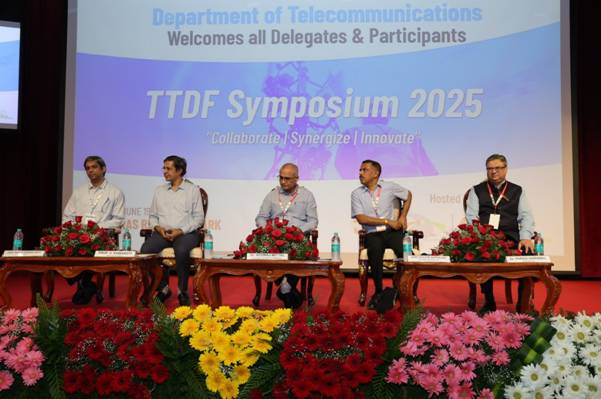TTDF Symposium 2025 Showcases India’s Deep-Tech Telecom R&D and 6G Innovation
In his address, Dr. Neeraj Mittal described the symposium as a pivotal moment in India's telecom journey, noting the country’s strategic position to leapfrog global innovation cycles.

- Country:
- India
India’s ambitions to emerge as a global leader in indigenous telecom innovation took a significant leap forward with the inauguration of the TTDF Symposium 2025, a landmark three-day event hosted at the IIT Madras Research Park. Organised by the Department of Telecommunications (DoT) in collaboration with IIT Madras and Telecom Centres of Excellence (TCOE) India, the symposium underscores the central role of collaborative R&D in building a sovereign and globally competitive telecom ecosystem.
The event was inaugurated by Dr. Neeraj Mittal, Secretary (Telecom), alongside dignitaries including Prof. V. Kamakoti, Director of IIT Madras, Shri Gulzar Natarajan, Additional Secretary (Telecom), Dr. Parag Agarwal, DDG (TTDF), and Prof. R.K. Ghanti from IIT Madras.
TTDF: Driving Indigenous Telecom Research
Launched on 1 October 2022, the Telecom Technology Development Fund (TTDF) is a flagship scheme under the DoT, implemented by Digital Bharat Nidhi (DBN). Its aim is to bridge the digital divide and establish India as a hub for next-generation telecom technology. TTDF fosters synergy between academia, industry, startups, and research institutions, encouraging innovation in areas such as 5G, 6G, quantum communication, IoT, and satellite networks.
Since inception, TTDF has sanctioned over ₹500 crore across 120 projects, with ₹187 crore already disbursed. Notably, more than 1300 proposals have been received, reflecting strong interest across India’s innovation landscape.
Inaugural Address: Seizing the Telecom Innovation Moment
In his address, Dr. Neeraj Mittal described the symposium as a pivotal moment in India's telecom journey, noting the country’s strategic position to leapfrog global innovation cycles.
“This is more than just an event—it is a call to action. We must optimise India’s collective resources, align innovation with national needs, and ensure that every rupee spent drives long-term impact,” said Dr. Mittal.
He also announced the development of a dedicated TTDF resource-sharing portal, aimed at enabling seamless collaboration and reducing duplication in R&D efforts. Further, he invited stakeholders to provide suggestions on refining the scheme’s administrative and funding mechanisms for improved efficiency and impact.
Key Milestones and New Projects Announced
The symposium witnessed the unveiling of the Multi-Core Fiber (MCF) Testbed Project, a landmark initiative in optical communication developed by IIT Madras and STL Technologies. The infrastructure includes:
-
4.07 km of underground and 1.20 km of aerial optical cable installations
-
12 multi-core fibers (4 cores each) alongside 12 single-mode fibers
-
Open access for academia and industry to test interoperability and use cases
This facility marks a step forward in building India’s next-gen optical communication backbone, essential for data-heavy applications like AI, 6G, and high-frequency trading.
Driving Collaboration for Impact
The event, attended by around 500 participants, includes a wide cross-section of India’s telecom ecosystem:
-
Principal Investigators and Deans
-
Startups and MSMEs
-
Telecom industry leaders
-
Officials from DoT, Bharat 6G Alliance, TSDSI, COAI, C-DoT
Shri Gulzar Natarajan, Additional Secretary (Telecom), highlighted TTDF as not just a funding mechanism, but a strategic initiative to build sovereign telecom capabilities.
“TTDF is about execution and impact. We must think beyond innovation and embrace strategic scale,” he said.
Prof. V. Kamakoti acknowledged IIT Madras’s critical role, noting that multiple TTDF projects have been awarded to the institution. He urged researchers to deliver impactful results that reflect the government's trust in academia.
TTDF’s Flagship Achievements and Focus Areas
TTDF 1.0 Achievements:
-
₹300+ crore sanctioned for 20 major projects
-
Development of Massive MIMO 5G antennas
-
Creation of an India-specific 5G Stack
-
Millimeter wave transceivers for rural broadband
-
LEO satellite communications
-
Post-quantum security platforms
Accelerated 6G Research Initiatives:
-
₹200+ crore sanctioned for 100 projects
-
Focus on:
-
AI/ML for IoT and intelligent networks
-
Non-Terrestrial Networks (NTN)
-
Quantum-enabled communications
-
Wideband spectrum sensing
-
Federated & reconfigurable protocols
-
Testing and Certification Reimbursement Scheme:
-
Launched in July 2024
-
Offers up to ₹50 lakh reimbursement for startups/MSMEs
-
Supports product certification and regulatory compliance
New Initiatives Launched in October 2024:
-
Quantum Encryption Algorithms (QEA)
-
Quantum Standardization and Testing Labs
Symposium Goals and Forward Vision
The TTDF Symposium 2025 is designed to:
-
Enhance coordination between funders, researchers, and industries
-
Streamline administrative bottlenecks in project execution
-
Promote commercialization and IPR generation
-
Shape India's future in telecom standards and global leadership
Technical sessions, live project showcases, and brainstorming forums throughout the symposium are fostering rich cross-sector interaction and knowledge exchange—vital for sustaining momentum in deep-tech telecom development.
A Vision for Telecom Sovereignty
The TTDF Symposium 2025 affirms India’s growing ambition to lead the world in telecom R&D, not just as a consumer of technology but as a creator and exporter. Through continued public-private collaboration, structured funding mechanisms, and deep engagement with academia, the Department of Telecommunications is steering the sector toward innovation, self-reliance, and global relevance.










